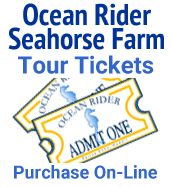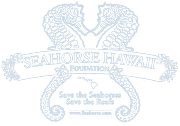Ocean Rider Seahorse Farm and Tours | Kona Hawaii › Forums › Seahorse Life and Care › Another accronym CB, TR, TB › Re:Another accronym CB, TR, TB
Dear hobbyist:
You’re very welcome! It sounds like you’ve done an excellent job of preparing your new tank for seahorses and I’d be happy to share my thoughts with you regarding the best specimens to start with and help you decipher those pesky acronyms.
CB to me indicates seahorses that are captive bred and raised, meaning their parents are cultured seahorses that were selectively bred at an aquaculture facility specifically for the pet trade and the offspring from that pairing were raised by hand in rearing tanks using state-of-the-art grow-out and maturation protocols and technologies. In my opinion, these are the best animals for the hobbyist because they have been born and bred for aquarium conditions for a number of generations and are hardy, highly adaptable seahorses with superior disease resistance. They will have been trained to eat frozen Mysis as their staple, everyday diet from a very tender age, making them much easier to feed and care for then wild-caught seahorses, pen-raised ponies, or tank-raised seahorses. Because they are reared by hand, they are accustomed to the human presence and quickly come to recognize their keepers as the givers of gourmet delights, becoming real pets in every sense of the word. And because each cohort is raised in close proximity with many other seahorses of similar size and age, they are highly gregarious, social animals that very much appreciate the company of others of their kind.
I agree with Kris that CB (i.e., captive bred) and TB (i.e., tank bred) are designations that are used pretty much interchangeably by hobbyists and the aquarium industry, but you still have to be wary because to my knowledge there are still no official standards or formally recognized nomenclature within the industry regarding these matters.
You are correct to be very leery regarding tank-raised (TR) seahorses. With regard to seahorses, the tank-raised designation generally indicates that the parents are wild seahorses; rather than having paired up and bred in the aquarium, tank-raised seahorses are generally the offspring of a gravid male removed from the wild. Once he gives birth, his brood is raised in captivity as usual, but of course his progeny have the same genotype or genetic makeup as wild seahorses, and are therefore no more accustomed to life in the aquarium than seahorses collected from the wild. As a result, they may have difficulty adjusting to aquarium conditions and frozen foods, and they will not have the same disease resistance as seahorses that have been captive-bred-and-raised for many generations.
Further complicating the situation is the advent of seahorses that have been "pen-raised" in the open sea under less than desirable circumstances, and which are now reaching the market in the United States in large numbers. Net Pens are a low-tech, low-maintenance method of farming seahorses that basically involves raising them in large enclosures in coastal waters. It is a common practice in Indonesia, many Asian countries, and the Philippines. In some cases, entire lagoons may be fenced off for that purpose. In the simplest form of pen rearing, broodstock are released into these enclosures, and then they and their progeny are pretty much allowed to fend for themselves thereafter. Any offspring that survive to marketable size are periodically harvested from the holding pens or lagoons.
Such operations are controversial with environmentalists for a number of reasons. Since the enclosures are open to the ocean, there is a real risk that adults or their fry may escape from the pens and establish colonies in the wild that may pose a threat to endemic seahorse populations. The pens are no barrier to disease organisms or parasites, so pathogens and parasites imported on foreign broodstock may spread to fishes in the wild (or vice versa). Wastes from the high density of penned animals are carried directly to ocean on prevailing tides and currents and may have a negative environmental impact on the surrounding area. There is no way to monitor the penned animals, hence no way to determine whether the seahorses they contain are actually born and raised in the enclosures or are merely wild-caught seahorses maintained in holding pens prior to being shipped off to unsuspecting consumers.
Pen-grown ponies can thus be risky for the hobbyist because of the circumstances under which they were raised. In essence, a mesh barrier is all that separates them from wild seahorses. There is no guarantee they will be disease free. Although many of them learn to accept frozen Mysis, there is no guarantee they will eat frozen foods since they are often accustomed to foraging for live prey. There is no guarantee they will be able to adjust to aquarium conditions since they are essentially raised in the sea. There is no guarantee that they are even captive bred, since the pens are not secure and livestock is introduced and removed from the pens and lagoons on a continuous basis. There is no guarantee they will be friendly and sociable rather than shying away from their keepers, since they are unaccustomed to the human presence. Pen-raised ponies are particularly misleading because they are almost never advertised as such — they are typically called captive raised or even captive bred seahorses, which can lead the unwary consumer to assume that they have been painstakingly raised using intensive mariculture techniques and rearing protocols. Nothing could be further from the truth.
Seahorse keepers that are shopping for their livestock at their LFS should therefore proceed with caution nowadays. Don’t assume that the new CITES regulations protecting the genus Hippocampus automatically assures that the seahorses sold at your LFS are cultured animals.
If the seahorses in question are over 4 inches in total length, there is a strong possibility the seahorses were harvested from the wild. It’s a mistake to assume that since CITES regulations to protect the genus Hippocampus went into effect in 2004, all the seahorses now being exported to the US have been captive-bred-and-raised. Plenty of wild-caught seahorses are still entering the country, destined for the pet trade.
The CITES regulations currently use a size limit to manage the seahorse fishery. Seahorses smaller than 10 cm or about 4 inches in length are illegal under CITES and cannot be imported or exported by member nations. However, wild-caught seahorses larger than 4 inches can still be imported legally if the necessary permits are obtained. Also, CITES regulates only the international trade in seahorses, so Hippocampus erectus and Hippocampus zosterae collected in US coastal waters are exempt from the regulations and can still be marketed freely within the US.
So when you purchase seahorses from your LFS there is a good possibility that they may have been procured from the wild or pen-raised rather than born and raised in captivity at an aquaculture facility. It’s fine if you want to give the new seahorses at your LFS a try, but because of the uncertainties surrounding them, be sure to play it safe and quarantine them before introducing them to your main tank, just as if they were wild seahorses. Assume they are wild or at best pen-raised and take all the necessary precautions so you won’t get burned. And I would also be a very sensible precaution to set up a new tank just for them, rather than mingling them with your existing captive bred livestock.
One other thing to bear in mind when you are ready to purchase the livestock for your seahorse tank is that it is very desirable to purchase the animals directly from the breeder, rather than from a wholesaler, online outlet, or retail outlet. Given a choice, it’s always better to eliminate the middlemen and order your seahorses directly from the breeder in order to obtain the healthiest possible livestock. When you obtain your specimens directly from the breeder, you know that they have been fed and handled by seahorse experts from the moment they were born until the moment they are shipped to the hobbyist. You are thus assured that the seahorses will arrive well-fed and in top condition. Seahorses from a High-Health aquaculture facility such as Ocean Rider are certified to be free of pathogens and parasites, and will thus reach you at the peak of health.
That’s may not be the case when seahorses are obtained from a wholesaler, online source, or your LFS. When seahorses are kept at a retail outlet, they are typically held in aquaria that share a common filtration system with all the rest of the tanks in the store. This means that the seahorses may have been exposed to pathogens and/or parasites carried on fishes from all the corners of the globe while they were in the holding tanks at your LFS or the wholesaler be obtained them from, making them potential disease vectors for a wide range of health problems.
In general, if you’re new to seahorse keeping, you will increase your chances for success if you start off with hardy, easy to feed, captive-bred-and-raised livestock you obtained directly from a reputable breeder.
Best of luck selecting just the right seahorses for your needs and interests!
Happy Trails!
Pete Giwojna




